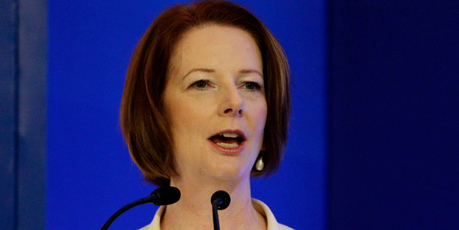
Australian Prime Minister Julia Gillard. Photo / AP
Australians appear to be split over Prime Minister Julia Gillard's
judgment that her main political rival is sexist. In a fiery speech to
Parliament on Oct. 9, Gillard branded opposition leader Tony Abbott a
misogynist for a string of allegedly sexist comments. Her commentary has been
lauded by feminists around the world, but a poll published Tuesday showed
Australians are divided. Abbott apologized last week for suggesting that Gillard's
government was inexperienced in family policy a criticism some saw as a cheap
shot at Gillard, who has no children.
The poll by Sydney market researcher Newspoll published in The
Australian newspaper found that 45 per cent of respondents said Abbott had
behaved in a sexist way toward Gillard recently and 39 per cent said he had
not. There was no clear majority view, with 16 per cent of respondents
undecided. How Abbott was judged on the sexism charge closely correlated with
how respondents intend to vote at general elections next year. Of those who
said Abbott is sexist, 66 per cent support Gillard's center-left Labor Party.
Of those who said he is not, 76 per cent back his conservative coalition.
Women were more likely than men to condemn Abbott for sexism. Of those
who said he was sexist, 43 per cent were women and 35 per cent were men. Of
those who responded that he was not sexist, 48 per cent were men and 41 per
cent were women.
Despite the divide, Gillard's public stance against sexism has gained
solid support. Gillard has said she stands by every word of her blistering
attack on Abbott and has vowed to speak out against sexism in the future
whenever she sees it. More than three in four respondents (78 per cent) said
Gillard's response to the sexism issue had been "about right,"
including 83 per cent of women and 72 per cent of men. Another 16 per cent
accused her of overreacting (22 per cent of men and 12 per cent of women),
while 5 per cent said she had underreacted (5 per cent of men and 4 per cent of
women). The poll was based on a random telephone survey of 1,218 voters
nationwide at the weekend. It had a 3 percentage point margin of error.
NZ Herald
Please share
No comments:
Post a Comment